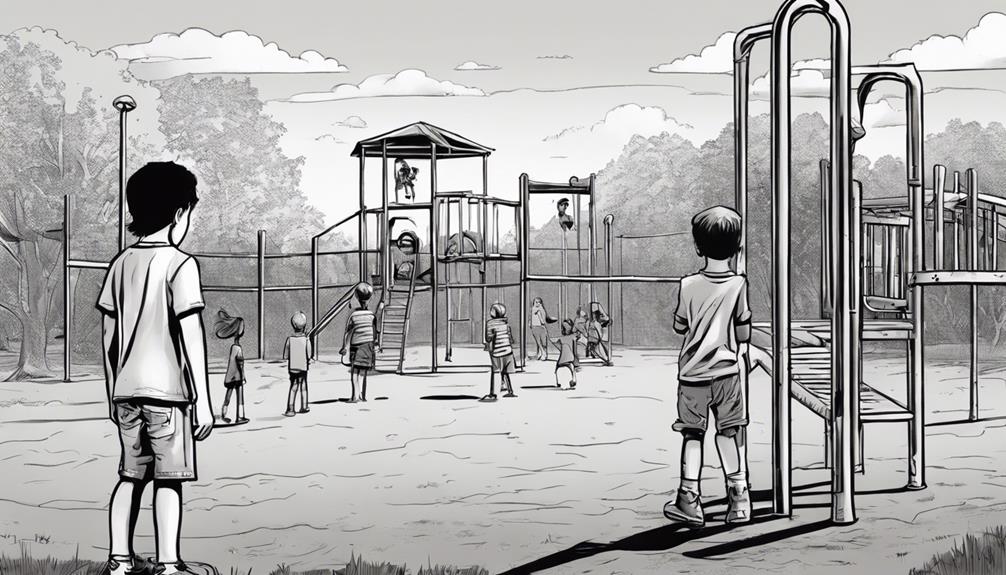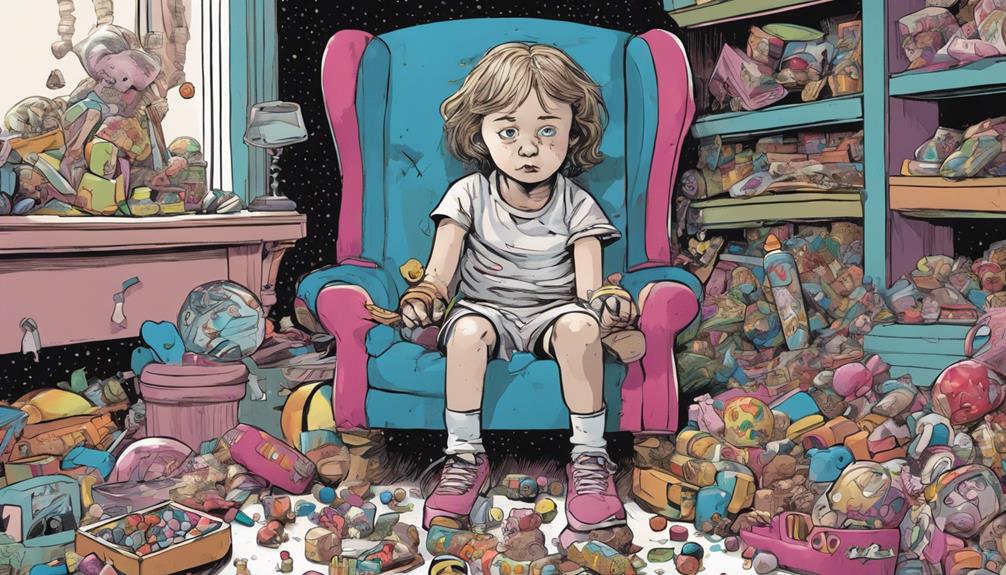Parenting Tips
The Impact of Upbringing: Can Parents Ruin Your Life?
Start unraveling how parental influence shapes your life, as we delve into the lasting impact of upbringing on self-worth and relationships.

Parents’ influence shapes **self-worth**, relationships, and well-being. Endless criticism or no boundaries can lead to low self-esteem and trust issues. These struggles may affect connections and problem-solving skills. Healing from the past by noticing harmful habits and getting professional help is crucial for growth. Understanding how upbringing impacts you helps break toxic cycles and take charge of your life. Addressing these effects supports **emotional healing** and building **healthy relationships**.
Key Takeaways
- Toxic parenting can lead to low self-esteem and trust issues.
- Dysfunctional upbringing impacts emotional well-being and relationships.
- Setting boundaries and seeking support are crucial for healing.
- Learning healthy relationship patterns is essential for personal growth.
- Therapy aids in understanding, healing, and breaking free from toxic patterns.
Parental Impact on Self-Worth
Parents play an essential role in shaping their children's self-worth through their actions and words. Research indicates that children of toxic parents often struggle with low self-esteem. Toxic parenting behaviors such as constant criticism and excessive control can have a detrimental impact on a child's self-image. When parents fail to provide validation and support, children may internalize feelings of inadequacy and worthlessness. Growing up in such environments can make building self-worth challenging for individuals.
If you have experienced toxic parenting, it's important to recognize that your low self-esteem may be a result of the environment you were raised in. Understanding how your upbringing has influenced your self-worth is the first step towards healing.
Seeking therapy or support groups can help you navigate these feelings and develop a healthier sense of self. Remember, it's possible to break free from the negative cycle of toxic parenting and cultivate a positive self-image through self-reflection and self-care.
Influence on Relationships

Growing up with toxic parents can greatly impact your ability to form healthy and fulfilling relationships later in life. Children raised in such environments often struggle with trust issues and low self-esteem, which can hinder their emotional wellbeing in adulthood. Research indicates that a dysfunctional upbringing can have lasting effects on one's capacity to maintain relationships that are nurturing and satisfying.
The unresolved childhood trauma stemming from toxic parenting can create barriers in communication and emotional intimacy within relationships. Individuals may find it challenging to be vulnerable or set boundaries, as the fear of getting hurt or being rejected lingers from their upbringing. This can lead to patterns of seeking validation and approval from others, potentially resulting in codependent dynamics.
Recognizing the impact of toxic parents on your relationship skills is the first step towards healing and creating healthier connections. Seeking therapy or support can assist in overcoming these challenges and fostering more positive and fulfilling relationships in the future.
Impact on Well-Being

The effects of a toxic upbringing on your overall well-being can have a profound and lasting impact. Growing up with toxic parents can greatly influence your mental health, leading to conditions like anxiety, depression, and low self-esteem. These struggles can persist into adulthood, affecting your relationships, decision-making skills, and overall life satisfaction. Research suggests that individuals raised by toxic parents may find it challenging to form emotional closeness, often dealing with trust issues and struggling to establish healthy boundaries.
To better understand the impact of toxic parenting on well-being, let's take a look at the following table:
| Effects of Toxic Upbringing on Well-Being |
|---|
| Increased risk of mental health issues such as anxiety and depression |
| Difficulty forming emotional closeness and healthy boundaries |
Toxic Parenting Behaviors

Exhibiting traits such as lack of empathy and emotional abuse, toxic parenting behaviors can have detrimental effects on a child's development and well-being. Here are three key toxic parenting behaviors to be aware of:
- Constant Criticism:
Toxic parents often engage in constant criticism, never being satisfied with their child's efforts. This can lead to feelings of inadequacy and low self-esteem in children.
- Setting Unrealistic Expectations:
Toxic parents may set unrealistic expectations for their children, pressuring them to achieve unattainable goals. This can create immense stress and anxiety in children who feel they can never measure up.
- Lack of Boundaries:
Toxic parents may exhibit a lack of boundaries, invading their children's privacy and personal space. This can result in children feeling suffocated and unable to develop a sense of autonomy.
Recognizing these toxic behaviors is crucial in protecting your well-being. Setting boundaries with toxic parents, seeking support from trusted individuals, and prioritizing self-care are essential steps in maintaining your mental and emotional health.
Effects on Forming Connections

Toxic parenting behaviors can greatly hinder your ability to form healthy connections and relationships throughout your life. Children raised by toxic parents may find it challenging to establish and maintain meaningful relationships in adulthood. Growing up with toxic parents can lead to difficulties in building and maintaining relationships due to trust issues and fear of rejection.
The impact of toxic parenting goes beyond childhood, affecting how individuals communicate and interact with others in their adult lives. Forming connections becomes a challenging task when toxic parents have hindered the development of social skills and emotional intelligence needed for healthy relationships. The effects of toxic parenting can linger, making it hard to trust others, express emotions openly, or set boundaries in relationships.
Overcoming these hurdles often requires introspection, therapy, and learning healthy relationship patterns. By recognizing the impact of toxic parents on your ability to form connections, you can take steps to heal and cultivate fulfilling relationships based on mutual respect and understanding.
Challenges in Navigating Life

Growing up in a challenging environment can shape how you make decisions, handle tough emotions, and deal with stress.
Your upbringing plays a pivotal role in developing your emotional resilience and coping strategies as you navigate through life.
Understanding these influences can help you build healthier ways of managing difficulties and setting yourself up for success.
Parental Influence on Decisions
Coping with life's challenges can be greatly influenced by the decisions parents make during a child's upbringing. Parents play an essential role in shaping their children's values, beliefs, and decision-making abilities, which can have long-lasting effects on their lives.
Here are three key points to ponder regarding parental influence on decisions:
- Toxic Parents Impact: Children raised in toxic environments may struggle with developing healthy decision-making skills. Controlling or abusive behavior can hinder a child's ability to make independent choices in adulthood.
- Learned Behaviors: Children often learn how to make decisions by observing their parents. If parents model effective decision-making processes and encourage autonomy, children are more likely to navigate life challenges confidently.
- Empowerment vs. Hindrance: Parental involvement in decision-making can be a double-edged sword. While supportive guidance can empower children, overly controlling behavior may hinder their ability to make independent choices. Establishing healthy boundaries is paramount in fostering independence and resilience in children.
Emotional Resilience Development
Developing emotional resilience is essential for effectively handling life's challenges. Your ability to bounce back from setbacks and navigate difficult situations is greatly influenced by your childhood experiences.
Toxic parents, who may be overly critical, neglectful, or abusive, can have a detrimental impact on a child's self-esteem and hinder the development of emotional resilience. These negative experiences can make it harder for you to cope with adversity and setbacks later in life.
However, it's important to remember that emotional resilience can be cultivated. Building resilience involves processing past traumas, seeking support from positive relationships, and learning healthy coping mechanisms.
By acknowledging and addressing the effects of toxic parenting, you can take steps towards healing and developing greater emotional strength. Through self-reflection, therapy, and practicing self-care, you can work towards building a stronger foundation for handling life's challenges with resilience and grace.
Coping Mechanisms Learned
Inherited coping mechanisms from toxic parenting can greatly impact your ability to navigate life's challenges effectively. Coping mechanisms learned in childhood can shape how you handle difficult situations as an adult.
Here are three key aspects to take into account:
- Echoism Behavior: Growing up in a toxic environment where your needs were constantly overshadowed can lead to echoism behavior, where you prioritize others' needs over your own. This can make it challenging to assert yourself and set boundaries when necessary.
- Difficulty in Setting Boundaries: Toxic parenting often fails to provide examples of healthy boundaries, making it hard for you to establish and maintain boundaries in your own life. This can result in feeling overwhelmed or taken advantage of in various relationships.
- Negative Outlook on Life: Constant exposure to negativity and belittling can instill a pessimistic view of the world. This can hinder your ability to approach challenges with optimism and resilience, impacting your overall well-being.
Learning to recognize these coping mechanisms and actively work on setting boundaries can help you navigate life's obstacles more effectively.
Healing From Past Experiences

Reflecting on childhood trauma is an essential initial step in the process of healing from past experiences. Growing up with toxic parents can have a significant impact on a child's self-esteem and overall well-being. It's important to acknowledge the effects of such upbringing on your current life in order to begin the healing journey. Seeking support from mental health professionals can provide valuable insights and tools to process and overcome the lingering effects of a toxic childhood.
Identifying and changing negative behavioral patterns learned from toxic parenting is essential for healing and personal growth. By recognizing these patterns and actively working to replace them with positive behaviors, you can gradually break free from the cycle of toxic influences.
Prioritizing self-care and emotional well-being is also key in this journey. Taking time to nurture yourself, practice self-compassion, and engage in activities that bring you joy can aid in the healing process. Remember, healing from past experiences is a gradual process, but with dedication and support, it's possible to overcome the impact of a toxic upbringing.
Breaking Free From Toxic Patterns

Ready to break free from those toxic patterns that have been holding you back?
Recognize those harmful behaviors, set some healthy boundaries, and don't be afraid to seek professional support along the way.
Recognizing Harmful Behaviors
Recognizing harmful behaviors from your parents is the first step towards breaking free from toxic patterns and creating a healthier environment for yourself.
Here are three key signs to watch out for:
- Controlling Behavior: If your parents constantly dictate what you do, who you see, or how you feel, it may indicate toxic patterns. Understand that this behavior isn't healthy or essential.
- Manipulative Tactics: Parents who use guilt, threats, or emotional blackmail to get their way are exhibiting manipulative behaviors. Recognizing these tactics can help you set boundaries.
- Abusive Actions: Physical, emotional, or verbal abuse from parents is never acceptable. It's important to recognize these harmful behaviors and seek help to break free from the toxic cycle.
Establishing Healthy Boundaries
Establishing healthy boundaries is essential for breaking free from toxic patterns and creating a more positive environment for yourself. When dealing with toxic parents or harmful influences, setting boundaries is a powerful way to protect your emotional well-being. By clearly defining what behaviors are acceptable and unacceptable, you empower yourself to prioritize your needs and values. Boundaries serve as a form of self-care and self-respect, allowing you to cultivate a safe and healthy space for personal growth.
When setting boundaries with toxic parents, it's important to communicate assertively and consistently. This could mean limiting interactions that drain your energy or establishing rules for respectful communication. By enforcing these boundaries, you reclaim control over your life and relationships.
Seeking Professional Support
When addressing toxic patterns from your upbringing, seeking professional support can be instrumental in breaking free and fostering personal growth. Therapy offers a safe and supportive environment to work through the impact of toxic parents on your life. Here are three key benefits of seeking therapy:
- Insight and Understanding:
Therapy can help you gain insight into how toxic patterns from your upbringing have influenced your behavior and relationships. Understanding these dynamics is the first step towards breaking free from negative cycles.
- Tools and Coping Mechanisms:
A mental health professional can provide you with tools and coping mechanisms to navigate interactions with toxic parents. Learning healthy ways to set boundaries and communicate effectively is essential for your well-being.
- Healing and Growth:
Frequently Asked Questions
Can Parents Negatively Impact a Child's Life?
Absolutely, parents can have a significant impact on a child's life.
Toxic parenting behaviors, like lack of support or emotional abuse, can lead to lasting negative effects on your self-esteem, trust, and relationships.
Research shows that parental favoritism can also harm your mental health, causing issues like low self-esteem and anxiety.
It's important to recognize these impacts and seek support to heal from any negative experiences in your upbringing.
How Your Upbringing Affects Your Parenting?
Your upbringing greatly influences your parenting style. The way your parents raised you can shape how you interact with your own children.
Positive experiences often lead to more nurturing and supportive parenting, while negative ones can sometimes result in less effective or even harmful behaviors.
Understanding how your upbringing affects your parenting can help you make conscious choices to break negative cycles and create a loving and healthy environment for your kids.
What Is the Most Damaging Effect of Parents Being Too Hard on Their Children?
When parents are too hard on you, the most damaging effect is often low self-esteem. Constant criticism and high expectations can lead to anxiety, depression, and a negative outlook on life.
These experiences might make it challenging for you to set boundaries, cope with stress, and form healthy relationships.
Research shows that toxic parenting behaviors can cause trust issues, fear of rejection, and difficulties in forming secure attachments, impacting your mental health and well-being into adulthood.
What Is Considered a Bad Upbringing?
A bad upbringing can involve neglect, abuse, or inconsistent parenting behaviors. Toxic parenting, marked by control, manipulation, and emotional abuse, deeply impacts a child's development.
Dysfunction in families, with poor communication patterns, contributes to a detrimental upbringing. Lack of emotional support, harsh criticism, and unrealistic expectations are common in such environments.
Research shows children from toxic backgrounds are more prone to mental health struggles, low self-esteem, and relationship challenges as adults.
Did My Upbringing Lead to Parents Ruining My Life?
Growing up, many individuals can’t help but feel like “the struggles of growing up parents ruin everything.” While it’s true that upbringing can significantly impact a person, it’s important to remember that we all have the power to shape our own lives and overcome any challenges that may have arisen from our childhood experiences.
Conclusion
To sum up, parents have a significant impact on our lives, shaping our self-worth, relationships, and overall well-being.
It's important to recognize toxic behaviors and patterns in order to break free and heal from past experiences.
According to a study by the American Psychological Association, 1 in 5 adults have experienced some form of toxic parenting, highlighting the prevalence of this issue.
Remember, you have the power to overcome and thrive despite challenging upbringing.
Parenting Tips
Navigating the Hybrid Classroom: Tips for Success
Optimize your hybrid classroom experience with essential tips and strategies for seamless technology integration, engaging lessons, and fostering community connections.

Managing a hybrid classroom means using **essential tech tools**, planning fun lessons, building connections, keeping students interested, and making good use of time. Use the right hardware, ensure everyone has a device, and help remote students with video tools. Plan lessons that mix both in-person and remote topics, and aim to make them fun. Create a sense of community to bridge the gap, encourage interaction, and use real-world applications to keep students engaged. Use time wisely by prioritizing activities and setting clear timelines. **Master** these strategies for hybrid classroom success. [Learn more about maximizing your hybrid classroom potential.](#)
Key Takeaways
- Integrate essential technology tools for seamless hybrid classroom operation.
- Meticulously plan engaging lessons for both in-person and remote learners.
- Foster a sense of community by encouraging interaction and participation.
- Boost student engagement with interactive activities and multimedia resources.
- Manage time effectively by prioritizing tasks and establishing clear timelines.
Technology Integration Essentials
Incorporating essential technology tools and devices is vital for seamless integration in the hybrid classroom setting.
To facilitate effective online classes, teachers and students must have appropriate hardware like cameras, screens, projectors, and microphones. Universal use of similar devices fosters collaboration and guarantees a smooth learning experience.
Remote students may require guidance on utilizing video conferencing tools to engage actively in lessons. It is essential to maintain traditional classroom management principles even in the virtual environment.
Mastering Lesson Planning

Efficient lesson planning is fundamental for successful navigation of the hybrid classroom environment. To master lesson planning effectively, teachers should consider the following:
- Organize: Meticulously plan and organize lessons to guarantee smooth delivery.
- Prioritize: Determine key topics for in-person and remote learning, balancing both environments.
- Engage: Create engaging activities that foster participation and interaction among all students.
Fostering Community Engagement

To cultivate a thriving learning environment in a hybrid setting, fostering community engagement is essential. Building a sense of community helps bridge the physical gap between in-person and remote learners. Encouraging interaction and participation beyond the curriculum is vital. Teachers play a pivotal role in modeling ideal conduct to enhance student engagement.
By implementing engagement tactics, such as promoting closeness, boosting morale, and ensuring psychological safety, students are more likely to actively participate in the learning process. Creating opportunities for both in-person and remote students to collaborate and engage with one another can greatly enhance the overall learning experience.
Boosting Student Engagement

Enhancing student engagement is pivotal in creating a dynamic and interactive learning environment within the hybrid classroom setting. To boost student engagement effectively, consider the following strategies:
- Implement interactive activities to stimulate interest and participation.
- Utilize multimedia resources to cater to diverse learning preferences.
- Provide real-world applications of concepts to enhance relevance and motivation.
These approaches can help students feel more connected to the material and foster a sense of active involvement in their learning process.
Efficient Time Management

Managing time effectively in a hybrid classroom requires meticulous planning and coordination to optimize student learning experiences. Efficient time management guarantees the smooth flow of lessons and activities, maximizing the benefits of both in-person and remote learning. To assist in this endeavor, consider the following strategies:
| Time Management Strategies | Description | Benefits |
|---|---|---|
| Prioritize Tasks | Organize tasks by importance | Enhances productivity |
| Set Clear Deadlines | Establish clear timelines | Promotes accountability |
| Utilize Technology Tools | Use tools like calendars | Facilitates organization |
| Create Daily Schedules | Plan daily activities | Improves time allocation |
| Review and Adjust | Regularly assess progress | Allows for timely changes |
Frequently Asked Questions
How Can Teachers Ensure Equal Participation Between In-Person and Remote Students?
Teachers can promote equal participation between in-person and remote students by fostering an inclusive environment through balanced engagement strategies, involving all students in discussions, interactive activities, and collaborative tasks. Regularly monitoring and encouraging participation are key.
What Are Some Effective Strategies for Managing Student Distractions in a Hybrid Classroom?
In a hybrid classroom, managing student distractions is essential for maintaining focus. Implement strategies like setting clear expectations, utilizing interactive tools, fostering student accountability, and providing structured breaks to enhance engagement and minimize disruptions.
How Can Teachers Encourage Peer-To-Peer Interaction in a Hybrid Setting?
To foster peer-to-peer interaction in a hybrid setting, teachers should facilitate collaborative activities, group discussions, and teamwork tasks that engage both in-person and remote students. Encouraging communication through various platforms can enhance social connections and learning outcomes.
What Tools Can Be Used to Track Student Progress and Engagement in Real-Time?
In the dynamic landscape of hybrid education, utilizing tools like interactive dashboards, real-time polling software, and AI-driven analytics can enable educators to monitor student progress and engagement with unparalleled precision, fostering a conducive learning environment.
How Should Teachers Handle Technical Issues During Live Hybrid Classes?
During live hybrid classes, teachers should promptly address technical issues by calmly troubleshooting or seeking immediate technical support to minimize disruptions. Clear communication, preparation with backup plans, and familiarity with technology are key to maintaining the flow of instruction.
Conclusion
To sum up, successfully managing the hybrid classroom requires strategic planning and effective implementation of technology tools, lesson plans, community engagement, student involvement, and time management.
One interesting statistic to note is that according to a recent survey, 76% of teachers believe that integrating technology in the classroom has improved student learning outcomes.
By following these essential tips and strategies, educators can create a cohesive learning environment that meets the needs of both in-person and remote students.
Parenting Styles
Balancing Act: Authoritative Parenting Vs Permissive Parenting
Unlock the secrets to raising well-adjusted kids by understanding the delicate balance between authoritative and permissive parenting styles.

Balancing the tricky act of raising kids means juggling growth support and setting rules, making one choose between **authoritative** and **permissive** parenting. Permissive parents give lots of **freedom**, but it might lead to poor discipline. **Authoritative** parents create a **nurturing** environment, boosting social, cognitive growth, and better **resilience**. Clear rules with loving guidance are key. Learn these methods for raising well-rounded kids.
Key Takeaways
• Authoritative parenting balances warmth and structure, promoting social and cognitive development, whereas permissive parenting lacks discipline and boundaries.
• Setting clear rules and boundaries is essential to help children learn decision-making skills and develop self-regulation.
• Permissive parenting can lead to rebellious behavior, impulsiveness, and lower self-control, whereas authoritative parenting fosters resilience and better academic performance.
• Finding a balance between autonomy and guidance is crucial, as it enables children to develop important life skills and make informed decisions.
• Consistency is key in setting boundaries, as it provides a sense of structure and security, promoting growth, discipline, and accountability.
Understanding Parenting Styles
When it comes to raising children, you'll likely encounter two dominant parenting styles: authoritative and permissive, each with its own set of characteristics and outcomes.
As a parent, understanding these styles is important in shaping your child's development. The authoritative parenting style emphasizes a balance of warmth and structure, promoting children's social and cognitive development. This approach has been linked to higher self-reliance, resilience, and better academic performance in children.
On the other hand, the permissive parenting style allows for freedom and autonomy but may lead to children lacking discipline and important life skills. This approach can result in more rebellious behavior, impulsiveness, and lower self-control in children.
It's crucial to recognize that both styles have their strengths and weaknesses. Striking a balance between the two is necessary in fostering a nurturing environment that encourages growth and development.
The Importance of Balance

Often, parents struggle to find the sweet spot between providing guidance and giving their children the freedom to make choices, but achieving this balance is essential for fostering healthy development.
As you navigate the complexities of parenting, you'll need to strike a balance between setting clear rules and boundaries while allowing for flexibility. This balancing act is vital for children to learn boundaries and develop decision-making skills.
By providing structure and guidance, you'll help your children develop independence and responsibility. However, if you're too rigid, you may stifle their growth. On the other hand, if you're too lenient, they may lack direction.
The key is to find a balance that allows for autonomy while still providing guidance. By doing so, you'll raise well-adjusted and self-reliant children who are equipped to make informed decisions.
Authoritative Parenting Explained

By embracing authoritative parenting, you'll create an environment where your child can thrive, as this approach expertly balances warmth and discipline to promote healthy development. This style of parenting is all about finding a balance between being responsive to your child's needs and setting clear boundaries. By doing so, you'll foster open communication, independence, and responsibility in your child.
| Aspect | Description | Benefit |
|---|---|---|
| Clear Expectations | Setting clear rules and consequences | Encourages responsibility and accountability |
| Open Communication | Encouraging open dialogue and active listening | Fosters healthy relationships and trust |
| Balanced Discipline | Combining warmth and discipline | Promotes healthy child development and self-esteem |
As an authoritative parent, you'll provide guidance and support while allowing your child to make choices within reasonable limits. This approach has been shown to lead to higher self-esteem, better social skills, and academic success in children. By adopting an authoritative parenting style, you'll create a nurturing environment that promotes healthy child development and sets your child up for long-term success.
The Risks of Permissive Parenting

As you explore the risks of permissive parenting, you'll discover that this approach can lead to a lack of boundaries, increased entitlement, and behavioral problems in children.
Without clear guidelines and discipline, kids may develop an excessive sense of self-importance, making them more prone to rebellious and impulsive behavior.
Lack of Boundaries
When children are given too much freedom without guidance, they may struggle to develop self-regulation skills, leading to a lack of boundaries that can have lasting effects on their development. As a parent, you may think you're giving your child the freedom to make their own choices, but in reality, you're depriving them of the structure and discipline they need to thrive.
Permissive parenting often lacks clear boundaries, allowing children to make decisions without guidance, which can hinder their ability to develop self-regulation skills.
This lack of boundaries can have serious consequences, including:
- Behavioral problems and academic underachievement
- Difficulty in social interactions and forming healthy relationships
- Increased entitlement and a sense of expectation without effort
- Struggles with discipline and coping mechanisms in the face of adversity
Increased Entitlement
Raising children with permissive parenting, you inadvertently nurture a sense of entitlement, where they come to expect privileges and possessions without understanding the value of hard work and effort. This lack of boundaries and structure can lead to entitled behaviors, as children assume they deserve everything without putting in the effort.
Without rules and consequences, children may struggle to accept disappointment or setbacks, as they're used to getting what they want, when they want it. Permissive parenting fosters a mindset where children feel entitled to privileges and possessions without understanding the concept of earning or deserving them.
Research shows that children raised with permissive parenting are more likely to exhibit entitled behaviors and struggle with accepting disappointment. By not setting clear boundaries and expectations, you may unintentionally create an environment where your child develops an exaggerated sense of entitlement.
This can lead to difficulties in their personal and professional lives, as they struggle to adapt to the realities of the world outside the comfort of their childhood home.
Behavioral Problems
By giving your child too much freedom and too little discipline, aren't you inadvertently paving the way for behavioral problems down the line? Permissive parenting can have serious consequences, including increased impulsivity and aggressiveness in children. Without proper boundaries and discipline, kids may struggle with self-regulation, leading to reckless decision-making and a lack of self-control.
- Children may exhibit rebellious behavior and engage in risky activities, such as heavy drug use.
- Lack of structure and discipline can result in poor academic performance and underdeveloped social skills.
- Permissive parenting can lead to increased aggression and hostility in children.
- Without clear rules and boundaries, children may struggle to develop essential life skills, such as self-regulation and responsibility.
Setting Boundaries Effectively

As you navigate the complexities of parenting, you'll find that setting boundaries effectively is essential for establishing a sense of structure and guidance for your child.
By setting clear expectations, establishing healthy limits, and maintaining consistency, you can create an environment that fosters growth, discipline, and security.
Clear Expectations Matter
Establishing clear expectations is essential in authoritative parenting, as it enables children to understand their boundaries and responsibilities, fostering a sense of security and structure in their lives. As a parent, you set the tone for your child's development by providing a clear understanding of what's expected of them.
This approach differs significantly from permissive parenting, where the lack of clear boundaries can lead to confusion and inconsistency for children. By setting clear expectations, you build trust and respect with your child, helping them develop self-discipline and decision-making skills.
- You help your child feel safe and secure by providing a sense of structure and routine.
- Clear expectations promote healthy boundaries, allowing your child to understand their role and responsibilities.
Without clear expectations, children may feel lost and insecure about their roles. By setting clear expectations, you empower your child to make informed decisions and take ownership of their actions.
Set Healthy Limits
Setting healthy limits by defining and consistently enforcing clear, specific rules that promote a sense of security and structure for your child is vital.
As a parent, establishing a parenting style that balances freedom with boundaries is necessary, allowing your child to thrive in a stable environment. Setting boundaries effectively is critical in teaching your child the importance of responsibility, accountability, and respect for themselves and others.
By setting healthy limits, you're providing a sense of safety, stability, and predictability in your child's life. This, in turn, helps them develop self-discipline, respect for rules, and decision-making skills.
When you set clear boundaries, your child will understand what's expected of them and the consequences of not meeting those expectations. This authoritative parenting style allows your child to grow and develop in a structured environment, where they can learn and make mistakes without feeling overwhelmed or lost.
Consistency Is Key
What makes boundaries truly effective is the consistency with which you enforce them, and deviating from this consistency can lead to confusion and behavioral issues in children. As a parent, it's important to establish clear and consistent rules, so your child understands what's expected of them.
This consistency helps create a sense of security and structure, allowing your child to thrive.
When setting boundaries, it's vital to establish consequences for rule violations, promoting accountability and teaching your child that actions have repercussions. Inconsistently enforcing boundaries can lead to confusion, making it challenging for your child to understand what's expected of them.
Some key takeaways to keep in mind:
- Consistency is key to effective boundary setting
- Clear rules help children understand expectations
- Establishing consequences promotes accountability
- Inconsistent boundaries can lead to confusion and behavioral issues
Encouraging Independence Safely

As you work towards raising an independent child, you must balance the need for autonomy with the need for safety and guidance. Authoritative parenting encourages independence by setting clear expectations and providing guidance, allowing your child to grow while maintaining a safe environment.
In contrast, permissive parenting may allow independence, but it lacks structure and can lead to negative outcomes. To guarantee your child's independence is both healthy and safe, it's crucial to establish clear boundaries and provide ongoing support and guidance.
This delicate balance allows your child to develop a sense of autonomy while minimizing potential risks. By setting appropriate limits and offering emotional support, you can foster a sense of independence that's both empowering and safe.
Navigating Teenage Rebellion

During the tumultuous teenage years, you'll likely face a period of rebellion, but the secret to managing this phase lies in the parenting approach you've established. If you've adopted a permissive parenting style, you may find yourself dealing with more frequent and intense rebellious behavior. This is because permissive parents often fail to set clear boundaries and consequences, leading teens to engage in risky behaviors and act out.
On the other hand, authoritative parents, who balance structure and warmth, are more likely to navigate teenage rebellion constructively. By establishing clear expectations and consequences, authoritative parents help teens understand the reasoning behind the rules and develop self-regulation skills.
Here are some key differences between permissive and authoritative parenting:
- Permissive parents often struggle to set boundaries, leading to power struggles with their teens.
- Teens in permissive households are more likely to engage in risky behaviors, such as substance abuse or delinquency.
- Authoritative parents maintain a strong, loving relationship with their teens, reducing the likelihood of rebellion.
- Clear consequences and open communication help authoritative parents guide their teens through the rebellious phase.
Building Resilience in Teens
By adopting an authoritative parenting approach, you can help your teenager develop resilience, an essential life skill that enables them to effectively cope with stress, challenges, and setbacks. This approach provides a balance of structure and support, allowing teens to learn problem-solving skills and emotional regulation. In contrast, permissive parenting may hinder resilience in teens by lacking necessary boundaries and discipline.
| Parenting Style | Impact on Resilience |
|---|---|
| Authoritative | Fosters resilience through structure and support |
| Permissive | Hinders resilience due to lack of boundaries and discipline |
| Authoritative | Builds resilience, enabling teens to navigate life's obstacles with confidence |
Long-Term Effects of Parenting

Your parenting style has a lasting impact on your child's future, shaping their academic performance, social skills, and self-esteem in profound ways. The long-term effects of your parenting style will influence the person they become, and it's crucial to understand the consequences of your approach.
Research has shown that authoritative parenting leads to positive outcomes, such as higher academic achievement, better social skills, and increased self-esteem.
On the other hand, permissive parenting can have negative consequences, including:
- Increased impulsivity and aggression
- Difficulty forming healthy relationships
- Lack of discipline and poor self-regulation
- Struggles with authority figures
In contrast, authoritative parenting has been linked to lower rates of substance abuse, higher levels of resilience, and better coping mechanisms in adulthood.
Frequently Asked Questions
What Is the Most Balanced Parenting Style?
You're likely wondering what the most balanced parenting style is.
According to child development experts, it's authoritative parenting, which combines warmth and setting limits to empower children. This approach encourages open communication, respect for children's needs, and clear expectations, promoting responsibility, independence, and secure self-development.
Research shows that children raised with authoritative parenting have better social and cognitive skills, self-reliance, and resilience.
What Is the Difference Between Authoritative Parenting and Permissive Parenting?
As you navigate the complexities of parenting, you're likely to encounter two distinct approaches: authoritative and permissive parenting.
The key difference lies in their contrasting philosophies. Authoritative parenting strikes a balance between setting clear boundaries and offering emotional support, while permissive parenting prioritizes freedom and flexibility.
You'll notice that authoritative parents foster independence and self-discipline, whereas permissive parents may inadvertently create entitled and impulsive children.
What Is the Middle Between Authoritarian Parenting and Permissive Parenting?
You're likely familiar with the extremes of authoritarian and permissive parenting, but what about the middle ground?
The answer lies in authoritative parenting, which strikes a balance between structure and responsiveness. This approach combines warmth and limits, providing a nurturing environment while setting clear expectations and boundaries.
What Are the 4 Types of Parenting Styles?
You're likely aware that parenting styles vary, but did you know there are four main types? According to psychologist Diana Baumrind, these styles are authoritarian, authoritative, permissive, and neglectful.
Each style has distinct characteristics, effects on children's behavior, and implications for their emotional development and well-being. Understanding these differences can help you make informed decisions about your parenting approach.
What are the key differences between Authoritative and Permissive Parenting styles?
When it comes to parenting, the authoritative vs permissive parenting styles are distinct. Authoritative parenting is characterized by setting clear expectations and boundaries while being nurturing. On the other hand, permissive parenting involves being more lenient and indulgent, often lacking clear guidelines. Both styles have different impacts on children’s behavior and development.
Conclusion
As you navigate the complexities of parenting, remember that striking a balance between authoritative and permissive approaches is essential. Research suggests that parents who adopt an authoritative style, characterized by warmth, communication, and boundaries, raise children with better social and emotional skills.
In fact, a staggering 75% of children from authoritative homes exhibit higher self-esteem and fewer behavioral problems. By embracing a balanced approach, you'll empower your child to thrive in an ever-changing world.
Parenting Tips
Unleash Your Public Speaking Potential With Confidence
Dive into mastering public speaking with confidence by learning essential techniques to captivate your audience and overcome stage fright.

Boost your public speaking skills by nailing the basics. Know your audience and design a clear speech layout. Tackle stage fright with deep breaths and expressive body language. Handle Q&A sessions calmly and confidently. Use visual aids to make your point stronger. These tips will unlock your public speaking potential and skyrocket your confidence.
Key Takeaways
- Practice speaking in front of a mirror multiple times for confidence.
- Utilize deep breathing and visualization techniques to overcome stage fright.
- Tailor your speech to connect with the audience on a personal level.
- Embrace non-verbal communication through eye contact and confident body language.
- Use clear speech structure with a compelling opening and strong conclusion.
Preparation for Public Speaking
Preparing meticulously for public speaking is essential for delivering a successful and impactful speech. Researching audience demographics, interests, and knowledge levels is vital. Understanding the importance of public speaking for communication skills, confidence, career growth, leadership, and effective idea conveyance is fundamental.
Practice speaking in front of a mirror and rehearse multiple times to build confidence. Creating a clear speech structure and tailoring content to connect on a personal level are key components. By focusing on these preparation steps, speakers can enhance their delivery and captivate their audience effectively.
Mastering Speech Structure

To excel in public speaking, mastering the structure of your speech is paramount for engaging and effectively conveying your message to the audience.
Begin with a compelling opening to grab attention, followed by a clear introduction of the main points. Organize these points logically, supporting them with relevant examples or stories. Guarantee a smooth shift between sections to maintain coherence.
End with a strong conclusion that reinforces your key message and leaves a lasting impact. Practice your speech multiple times to familiarize yourself with the content, tone, pace, and body language.
Embrace non-verbal communication through eye contact, confident posture, and effective gestures. Utilize visual aids sparingly to enhance, not overpower, your message.
Overcoming Stage Fright

Conquering stage fright is an essential aspect of delivering a successful public speech, requiring mastery of self-confidence and effective coping strategies. When facing stage fright, deep breathing exercises and visualization techniques can help calm nerves. It is important to focus on the message, engage the audience, and start with a strong opening. Enhancing presence through confident body language, eye contact, gestures, and voice modulation can also alleviate anxiety. Avoiding fidgeting, speaking clearly, varying pitch, and controlling the pace of speech are key strategies to overcome stage fright. Here is a table summarizing key points:
| Stage Fright Coping Strategies | Examples | Effectiveness |
|---|---|---|
| Deep breathing exercises | Diaphragmatic breathing | Calms nerves |
| Visualization techniques | Imagining a successful speech | Boosts confidence |
| Focus on the message | Engage with the audience | Reduces anxiety |
| Confident body language | Maintaining good posture | Enhances presence |
| Voice modulation | Varying pitch and pace | Controls nervousness |
Handling Q&A Sessions

When moving from delivering a speech to interacting with the audience in a Q&A session, it is important to maintain composure and actively listen to questions being posed.
During Q&A sessions, follow these key strategies:
- Listen Carefully: Pay close attention to each question to provide relevant responses.
- Remain Calm: Stay composed and confident, even if faced with challenging or unexpected queries.
- Engage with Gratitude: Thank the audience for their questions and show appreciation for their participation.
Visual Aids and Message Reinforcement

Utilizing visually appealing aids is pivotal in reinforcing the message delivered during a public speech. Visual aids, such as slides, props, or multimedia presentations, serve to enhance audience understanding and retention of key points.
When incorporating visual elements, it is essential to keep them simple, clear, and complementary to the spoken content. Overloading the audience with visuals can distract from the message, so it's essential to strike a balance that guarantees a memorable speech delivery.
Effective non-verbal cues, gestures, and body language can further reinforce the intended message, creating a cohesive and impactful presentation. Establishing a strong presence on stage through confident posture, eye contact, and appropriate hand movements enhances the overall delivery of the speech.
Frequently Asked Questions
How Can I Effectively Engage a Diverse Audience?
To effectively engage a diverse audience, tailor your content to resonate with their backgrounds and interests. Utilize engaging storytelling, interactive elements, and inclusive language. Encourage participation, listen actively, and adjust your delivery to guarantee everyone feels acknowledged and valued.
What Are Some Strategies to Handle Technical Difficulties During a Presentation?
In the field of public speaking, handling technical glitches demands a calm demeanor, quick thinking, and preparedness. Confirm backup plans for equipment failures, practice with the technology, and maintain composure to troubleshoot effectively.
How Do I Maintain Audience Interest Throughout a Longer Speech?
To maintain audience interest throughout a longer speech, engage them with compelling stories, interactive elements, and relevant examples. Vary your tone, pace, and delivery to keep them attentive. Use visuals sparingly to supplement key points and enhance message retention.
What Are Some Tips for Incorporating Humor Into a Serious Speech?
Incorporate humor strategically by using relevant anecdotes, witty remarks, or light-hearted observations to break tension, engage the audience, and make complex topics more digestible. Balance humor with professionalism to maintain credibility and impact.
How Can I Address Audience Skepticism or Resistance During a Presentation?
To address audience skepticism or resistance during a presentation, employ strategic storytelling, provide credible evidence, acknowledge opposing viewpoints respectfully, and engage in active listening. Build trust by establishing common ground and demonstrating empathy towards differing perspectives for a more receptive audience.
Conclusion
To sum up, mastering the art of public speaking requires careful preparation, confident delivery, and effective message reinforcement. By honing speech structure, overcoming stage fright, and utilizing visual aids strategically, individuals can unlock their full potential as speakers.
Embracing these practices will not only enhance communication skills but also leave a lasting impact on the audience. With dedication and practice, anyone can become a compelling and confident public speaker.
-

 Parenting Styles1 week ago
Parenting Styles1 week agoWorst Parenting Style: Impact on Child Development
-

 Parenting Styles1 week ago
Parenting Styles1 week ago2023 Indiana Parenting Time Guidelines Update
-

 Vetted7 days ago
Vetted7 days ago15 Best Books on Step Parenting Every Blended Family Needs to Read
-

 Parenting Tips6 days ago
Parenting Tips6 days agoUnequal Responsibilities: When One Parent Does All the Parenting
-

 Parenting Tips1 week ago
Parenting Tips1 week agoFostering Love: How Much Do You Get Paid for Foster Parenting?
-

 Vetted6 days ago
Vetted6 days ago15 Best Parenting Books of All Time Every Parent Should Read
-

 Vetted22 hours ago
Vetted22 hours ago15 Best Co-Parenting Books Every Parent Should Read for Successful Co-Parenting
-

 Vetted6 days ago
Vetted6 days ago15 Best Books for Gentle Parenting Every Parent Should Read



















